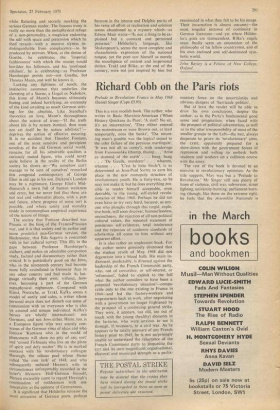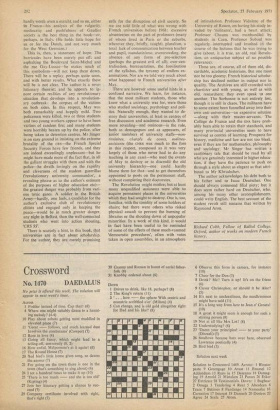Richard Cobb on the Paris riots
Prelude to Revolution: France in May 1968 Daniel Singer (Cape £3.95)
This is a very modish book. The author, who writes in Basic Marxisto-American ('When History Quickens its Pace'. `A riot? No sir, it's an insurrection', 'They either entered the mainstream or were thrown out, at least temporarily, onto the banks', 'The return- ing man's gamble was the logical sequel to the utter failure of the previous martingale', 'It was not all so corny'), with renderings from Varoomshka (thump, thump ... 'Arise ye damned of the earth' . . . bang, bang . . . 'De Gaulle, murderer' . . . whamm, whamm . . . 'C'est Ia lutte finale), is as determined as Jean-Paul Sartre to earn his place in the new monopoly structure of revolutionary youth. He is forty-two, so he may not make it; but he does everything pos- sible to render himself acceptable, even desirable, to the young, self-styled revolu- tionaries of May 1968. Perhaps he did not even have to try very hard, because, as any- one who ploughs through this turgid, exple- tive book, will soon discover, humourlessness, uncouthness, the rejection of all non-political cultural values, the repeated statement of ponderous self-evidences, total intolerance and the rejection of academic standards of scholarship all come to him without any apparent effort.
It is also rather an unpleasant book. For the author seems genuinely distressed that the student revolt of May 1968 did not degenerate into a blood bath. His main in- dictment, predictably, is directed against the leadership of the French Communist party, who, out of cowardice, or self-interest, or 'reformism', failed to exploit to the full what the author considers to have been a potential 'revolutionary situation'—compa- rable only to the one existing in France in 1944—and led the factory-workers and wage-earners back to work, after negotiating with a government no longer frightened by the prospect of a continuing general strike. They were, it appears, too old, too out of touch with the young (healthy) elements in the factories, who were anxious to see it through, if necessary, to a civil war. As he appears to be totally unaware of any French history prior to 1945, he is not surprisingly unable to understand the reluctance of the French Communist party to jeopardise the CGT and its own magnificent organisational, electoral and municipal strength as a parlia-
mentary force on the uncertainties and obvious dangers of 'barricade politics'.
But at least the reader will be able to draw his own conclusions, despite the author, as to the Party's fundamental good sense and pragmatism, when faced with the prospect of political adventurism, as well as to the utter irresponsibility of most of the smaller groups to the Left—the Psu, always desperate to prove its 'revolutionary' aims, the CFDT, apparently prepared for a show-down with the government forces of repression and willing to embark both students and workers on a collision course with the army.
The rest of the book is devoted to an exercise in revolutionary optimism. As the title suggests, May was but a 'Prelude to Revolution.' Mr Singer still sees plenty of hope of violence, civil war, subversion, street fighting, university-burning, parliament-burn- ing (though, like those on the extreme right, he feels that the Assemblee Nationale is
hardly worth even a match), and so on, either in France—his analysis of the vulgarity, mediocrity and pushfulness of Gaullist society is the best thing in the book—or, perhaps, in Italy. (He holds little hope for us or for the Dutch, and not very much for the West Germans.)
This is, then, a statement of hope. The barricades have been merely put off; and asphalting the Boulevard Saint-Michel and the rue Gay-Lussac—he makes much of this symbolism—will not keep them down. There will be a replay, perhaps quite soon, and with better results. What exactly these will be is not clear. The author is a revo- lutionary theorist; and he appears to ig- nore certain realities of any revolutionary situation that develops into a revolution- ary outbreak : the corpses of the victims on both sides. In this respect, May was both remarkably and happily mild. Two policemen were killed, two or three students and two young workers appear to have been victims of random fire; and many students were horribly beaten up by the police, after being taken to detention centres. Mr Singer is on easy ground in insisting on the extreme brutality of the CRS—the French Special Security Forces have few friends, and they are indeed exceedingly unpleasant—but he might have made more of the fact that, in all the gallant struggles with them and with the police—he dwells lovingly on the rapidity and cleverness of the student guerrillas ('revolutionary university commandos', a revealing phrase as to the author's estimate of the purposes of higher education etc)— the greatest danger was probably from vari- ous toxic gases. A soldier in the British Army—hardly, one feels, a candidate for the author's exclusive club of revolutionary elitists and engaged only in keeping the peace—would be in much greater danger, any night in Belfast, than the well-connected students who went into action shouting, 'CRS SS'.
There is scarcely a hint, in this book, that universities are in fact about scholarship. For the author, they are merely promising cells for the disruption of civil society. So we are told little of what was wrong with French universities before 1968: excessive absenteeism on the part of professors (many Of whom lived in Paris or the suburbs, wherever they, briefly, taught), pluralism, a total lack of communication between teacher and pupil, rnandarinisme, overcrowding, the absence of any form of pre-selection (perhaps the greatest evil of all), over-cen- tralisation, bureaucratism, the fossilisation of the syllabus, the tyranny of endless ex- aminations. Nor are wetold very much about what happened to French universities after May.
There are however some useful hints in a confused narrative. We learn, for instance, that the most militant students, those who knew what a university was for, were those who studied sociology, psychology and poli- tics. Naturally enough, they wanted to de- stroy their universities, at least as centres of free discussion and academic research. Even more revealing—and ominous—is the role, both as demagogues and as appeasers, of junior members of university staffs—non- titu/aires, chargeS de cours, maitres- assistants (the CNRS was much to the fore in this respect, composed as it was very largely of those who never had to do any teaching in any case)—who used the events of May to destroy or to discredit the old university hierarchy—one could hardly blame them for that—and to get themselves appointed to posts on the permanent staff, without completing their doctorates.
The Revolution might misfire; but at least many unqualified assistants were able to acquire permanent places in the universities which they had sought to destroy. One is, too, familiar, with the timidity of some holders of chairs; but there were others who risked physical assault to prevent the burning of libraries or the shouting down of unpopular minorities. In a work of this kind, it would in fact have been useful to be reminded of some of the effects of these much-vaunted 'democratic procedures', often with votes taken in open assemblies, in an atmosphere of intimidation. Professor Vidalenc of the University of Rouen, on having his study in- vaded by 'militants', had a heart attack; Professor Chaunu was manhandled by students in Caen. Professor Soboul was • regularly interrupted and insulted in the course of the lectures that he was trying to give (about, it is true, an old, real Revolu- tion, an antiquarian subject of no possible relevance).
These are, of course, all of them old, dis- cardable, academic historians. But one must not be too gloomy. French historical scholar- ship has declined neither in output nor in quality. The Archives are still crowded with chartistes and with young, as well as with old, researchers; they even speak to one another. The Sorbonne is not entirely, lost, though it is still in chaos. The militants have to some extent been funnelled away into their own anti-universities—an expensive solution —along with their master-servants. The College de France and the ENA have prob- ably been able to retain their standards, and many provincial universities seem to have survived as centres of learning. Prospects for history, medicine and law are not too bleak, even if they are for mathematics, philosophy and sociology. Mr Singer has written a cautionary tale that should be read by• all who are genuinely interested in higher educa- tion, if they have the patience to push on through a style about as elegant as that attri- buted to Mr Khrushchev.
The author acknowledges his debt both to his father and to Isaac Deutscher. One should always commend filial piety; but it does seem rather hard on Deutscher, who, among his many other accomplishments, could write English. The best account of the student revolt still remains that written by Raymond Aron.
Richard Cobb, Fellow of Balliol College, Oxford, author of works on modern French history.



































 Previous page
Previous page